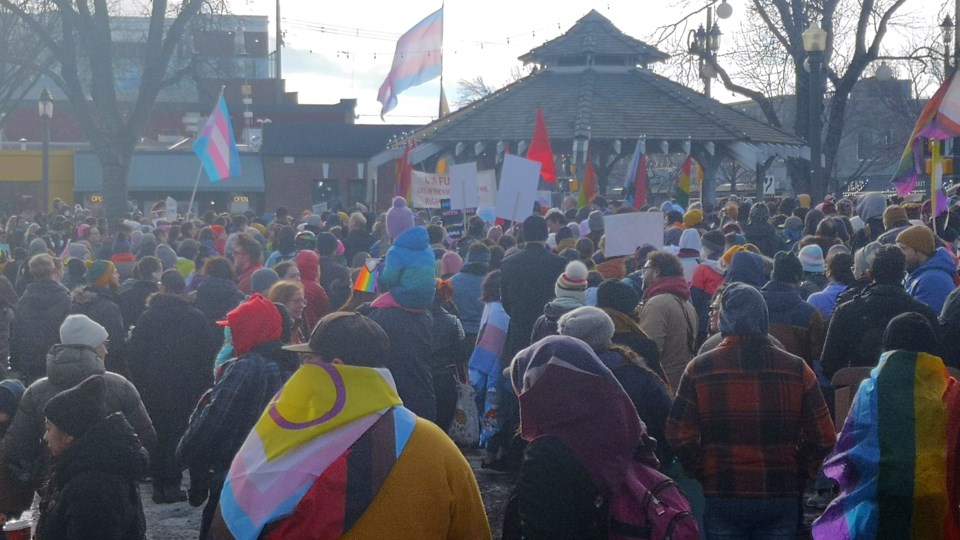Medical professionals, experts, and educators have warned proposed policies to restrict access to medical care for transgender youth and eliminate protections for 2SLGBTQI+ students in Alberta schools will undermine their fundamental rights and increase risk of harm for affected children and youth.
People in rural areas will likely be the most impacted, "because they are already those who ave the least access to any form of support," says Alex Marshall, a volunteer with the Fyrefly Institute for Gender and Sexual Diversity.
Marshall previously worked as Fyrefly's rural education coordinator, primarily helping teachers and schools align with policies and procedures with the best practices for supporting queer and trans youth.
Access to resources in rural areas is often related to a community's proximity to a major city, Marshall said. In many cases, a school's GSA (gay-straight alliance or gender and sexuality alliance) provides the only available in-person support.
"In a lot of schools in the province, or in a lot of communities throughout the province, (a GSA) is literally the only place that these kids can get some support and build some community; particularly in places where there's a lot of discrimination happening within their school, a lot of bullying, a lot of teasing a lot of exclusionary kind of behaviours that happens to 2SLGBTQ+ youth, being as they are so vulnerable," she said.
The right to a GSA is enshrined in the Education Act, which states a school must help students create a GSA if requested and protects the privacy and confidentiality of students who join one.
Premier Danielle Smith said new legislation is expected to be implemented in the fall which will require parental permission if youth 15 and under want to change their preferred name or pronouns, and have teachers inform parents if 16- or 17-year-old students make the change. These new rules effectively override Education Act protections, and will result in the loss of scarce inclusive, and supportive spaces for rural students, Marshall said.
"Their school is their only place where they have an opportunity to be supported. And these policies will have a very chilling effect on that. And we're likely going to see fewer supports available."
'Forcing kids out of the closet'
Nearly one in three homeless youth in Canada identify as being part of the 2SLGBTQI+ community, and family conflict resulting from a child coming out is the most common cause of homelessness for queer and trans youth.
Research from B.C. and the United States suggests indicates rural sexual-minority youth face higher levels of discrimination and suffer poorer mental health outcomes than those in urban centres, largely due to a dearth of available resources, increased isolation, and lack of acceptance in their communities.
Premier Smith has said that in circumstances of abuse, there are child protection laws that will be enforced. The premier also encouraged students, teachers, and parents who see children being bullied to come forward so adults can put a stop to it.
Evan Balgord, executive director of the Canadian Anti-Hate Network, said Alberta's proposed policies will make it harder to protect kids from bullying and create or exacerbate abusive situations at home for vulnerable populations.
"Now not only is that trans kid being bullied, but if they are in an abusive household, now their parents are going to be told that they are trans," Balgord said. "So, forcing kids out of the closet — whether they're gay, whether they're trans, whether they're bi, whatever their gender and sexual orientation — is incredibly dangerous for those small number of students who might have parents that are not going to accept them as they are. And it could create an abusive situation or worsen an abusive situation."
Given the disproportionate experiences of family conflict and homelessness among queer and trans youth that already exist in Alberta, "saying that our current supports are going to be able to handle this as it becomes worse is just not a reasonable expectation to have," Marshall said.
"Part of the reason that the Education Act was initially changed was because we saw that when students were outed, it led to bad outcomes. Students generally have a much better idea of what their home life is than teachers."
If youth sit at the dinner table and hear their parents make homophobic and transphobic jokes, or express disgust for trans people, they may feel unsafe, but "Child Protective Services isn't going to come in and support them," Marshall said.
"I've never worked with youth who didn't tell their families just for fun. The vast majority of youth I work with talk to their families, come out to their families. The only reason they don't is if they've heard or seen things that have made them trepidatious," she said.
Marshall said one of the reasons GSAs are valuable is because they act as a stepping stone for youth to have the "coming out conversation" with their families, and give kids a chance to ask questions of their peers: "How did you come out? What worked for you? How did you navigate this? Were your parents upset? Can you talk to me about that? What made it better? What can I do?"
"That's a big part of a lot of GSAs," she said. "And that's, again, the support that is going to be taken from these children."




